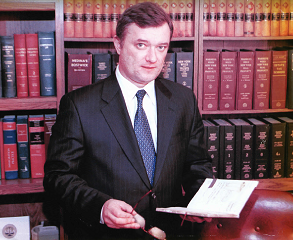Kancelaria Prawa Amerykańskiego w Polsce
adw. Robert Openhowski, Esq.
ul. Prusa 2.
00-493 Warszawa
Telefon bezposredni: (+48) 665-306-600
___________________________________________
E-MAIL: openhowski@op.pl
Wills and Succession in Polish Law
The law on succession of estates in Poland is rooted in civil law tradition and is entirely different in terms of procedures from that in common law countries. One important difference is that the Polish law does't recognize a personal representative of an estate is such broad capacity as an executor or administrator in English or American law has.
The estate passes as a matter of law unto the sucessors, either under statute (intestacy rules) or under a will. The court only confirms that legal fact in a form of a decree. Such inheritance decree states who participates in the estate and what is his or her percentage share thereof. At this stage the court doesn't even have an interest in knowing the composition or size of the estate, unless only for purpose of determining it's jurisdction or forum. If there's a disagreement on how to divide particular estate assets between holders of estate shares, any one of them may bring a suit to divide estate assets among successors. The court or successors themselves acting in concert sell and divide assets - not the executor. Please note: successors are personally liable for estate debts and have only six months to file an affidavit denying acceptence of inheritance in order to avoid liability for estate's debts. ( really !)
Procedure for the decree of inheritance is pretty straight forward and inexpensive. It may, though, require a lot of documentation, which must be presented to prove family relations. This is required in both testamentary and intestacy cases. (Those who would take under statute but are not named in a will do retain a legal claim for 1/2 of a share of what would be due to them under statute - there is 3 year statute of limitations on such claims). Thus the court determines the statutory successors and always notifies them all. Documents may be hard to find if client doesn't have precise information on places and times of births of all family members and does't provide complete documentation. Especially in a case where chain of inheritance goes through few generations, as the case frequently is, because for example no one cared to go through the process twenty of fifty years ago because there was no need to transfer title to property.
Things may get more complicated in international cases. One thing to note is that Polish courts have exclusive jurisdiction in succession where estate contains a real property located in Poland. In such case there will always be required a proceedings for inheritance decree from a Polish court. The title to real property will not pass unto sucessors under foreign court decree. However the will itself, if valid under the laws of country where actually made, is valid under the Polish law as well. So the Polish court will recognize a foreign will in the course of it's own proceedings and will give effect its terms.
Another important thing to note is citizenship of the testator and the beneficiaries. Many Polish citizens who emigrated in the 1950th do not realize that they may have lost their Polish citizenship under the citizenship act of 1951. (getting foreign citizenship was such triggering event). This affects Polish courts' jurisdiction as well as ability to inherit real property in Poland. If the property is a farm land we have to deal with numerous agricatural land acquisition rules enacted in Poland after the WWII to these days. The laws in effect at the time of death are applicable. Some of them are communist regimes' laws and are entirely unfit for democratic order, but most of them are still in effect. So do not expect that the result of the inheritance proceedings in Poland will be identical that in your jurisdiction. Please consult with me before filing any documents with any court or authority in Poland.
The foregoing is not intended to give you a course in Polish inheritance law, but rather to point a few important elements that normally would not apply to succession process in your jurisdiction. Almost all of the international inheritance cases that I have encountered required to deal with those issues, thus I think of them as important from practitioners view point.
Counsel, if you have a case involving a sucession in Poland, please feel free to call me directly at +48. 66 530 6600.

